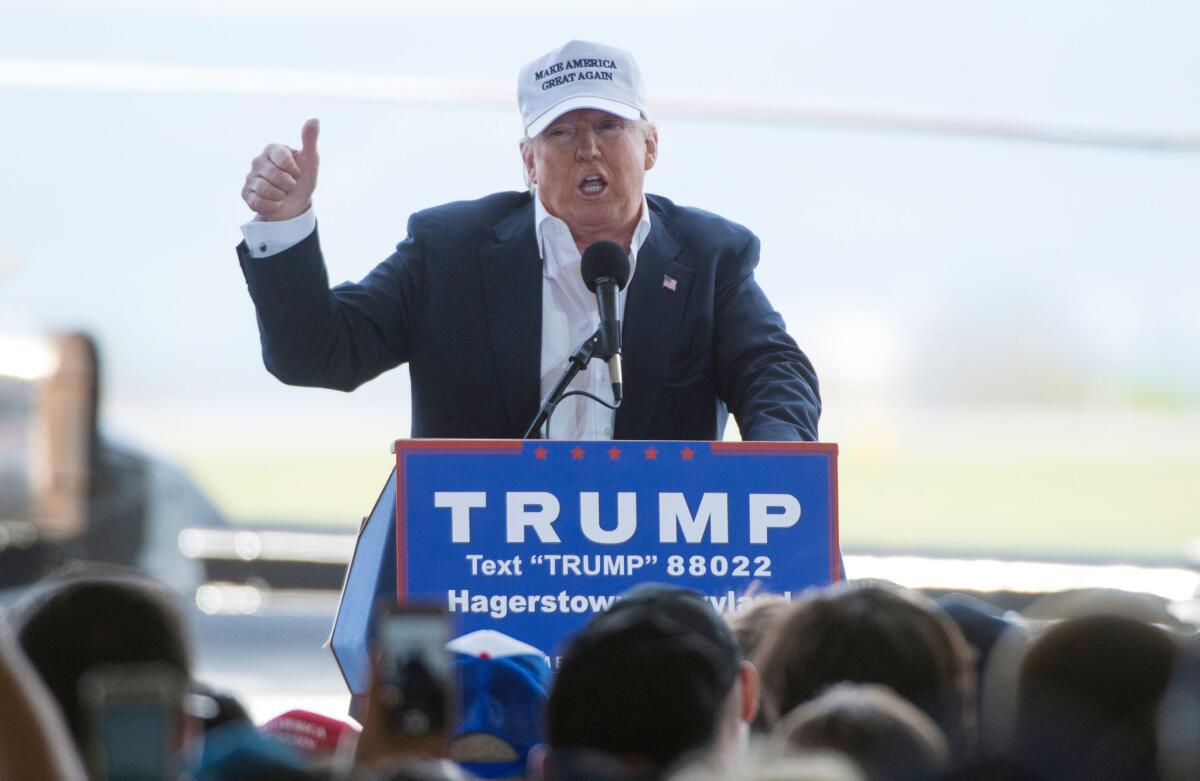Cruz and Kasich team up to stop Trump, saying they’ll each sit out future primaries

Republican presidential front-runner Donald Trump addresses a rally in an airplane hangar Sunday in Hagerstown, Md.
- Share via
Reporting from New Haven, Conn. — In the latest effort to upend Republican front-runner Donald Trump’s bid for the presidential nomination, the campaigns of rivals Ted Cruz and John Kasich announced Sunday night that they would join for a divide-and-conquer strategy in three states as they scramble to seize remaining delegates in a rapidly dwindling primary season.
Kasich will halt campaigning in Indiana, allowing Cruz to focus on the 57 delegates up for grabs in the state’s May 3 primary. Cruz will forgo Oregon later in May and and New Mexico in June. Those two states have a total of 52 delegates at stake.
The strategy underscores the unprecedented nature of the Republican presidential race, with GOP stalwarts refusing to line up behind the front-runner and instead embarking on an effort to stop Trump from securing the 1,237 delegates he needs for the nomination.
Though the campaigns did not say they were coordinating, the language in their announcements was practically identical and the statements were released within minutes of each other.
The prospect of Trump as the GOP nominee would doom Republicans both in this fall’s general election and the party’s long-term prospects, warned Jeff Roe, Cruz’s campaign manager.
Election 2016 | Live coverage on Trail Guide | Track the delegate race | Sign up for the newsletter
“Having Donald Trump at the top of the ticket in November would be a sure disaster for Republicans. Not only would Trump get blown out by [Hillary] Clinton or [Bernie] Sanders, but having him as our nominee would set the party back a generation,” Roe said in the statement.
Kasich’s goal is to have no candidate win the 1,237 delegates required to clinch the nomination, leading to an open nominating contest at the Republican National Convention in July in Cleveland, said John Weaver, his top strategist.
“Donald Trump doesn’t have the support of a majority of Republicans – not even close, but he currently does have almost half the delegates because he’s benefited from the existing primary system,” Weaver said.
The move marks a notable shift for Cruz, who has derided Kasich as a spoiler who was helping Trump’s chances of winning the GOP nomination.
“A vote for John Kasich is a vote for Donald Trump,” Cruz said in late March in Utah. “I don’t know if John Kasich is perhaps campaigning to be Donald Trump’s vice president, but he has been eliminated mathematically from having any chance of being the nominee.”
Both statements were aimed at super PACs supporting Kasich and Cruz, as well as groups formed with the express aim of stopping Trump from winning the nomination. Weaver even urged outside groups to “honor the commitments made by the Cruz and Kasich campaigns.”
An official with a leading anti-Trump group, #NeverTrump, hailed the plans.
“We’ve seen from victories in places like Ohio and Wisconsin that when #NeverTrump forces unite behind the one alternative that’s better suited to that state that we can beat Trump decisively,” senior advisor Rory Cooper said. “… We’re happy to see the Kasich and Cruz campaigns strategically using their resources to deny Donald Trump delegates where they are in the strongest position to do so.”
Trump immediately dismissed the effort, though, tweeting that Cruz and Kasich were desperately colluding.
Cruz and Kasich believe they can win the GOP nomination if no candidate reaches a majority of delegates on the first ballot at the convention and they can secure votes on subsequent ballots when fewer delegates’ votes are bound to their state’s popular votes.
Their campaigns said they plan to compete vigorously in the remaining contests, though California, the biggest prize left, offers another opportunity for their strategy of detente. The vast majority of the state’s 172 delegates are awarded by congressional district, not statewide popular vote. Though Trump leads in early polls, Cruz shows strength in the Central Valley and Kasich has potential to pick up delegates in the Bay Area. They have a stronger chance of keeping delegates from Trump if both campaign in the state but cede some districts to each other.
But for Cruz or Kasich to nab the nomination, either must vanquish Trump.
Talk has long swirled on the campaign trail about the men forming a temporary alliance to allow each to compete where he is strongest and to avoid diluting the anti-Trump vote. Former Massachusetts Gov. Mitt Romney, the party’s 2012 nominee, suggested such a tactical agreement in a March speech excoriating Trump as unfit for the presidency.
“I would vote for Marco Rubio in Florida, for John Kasich in Ohio and for Ted Cruz or whichever one of the other two contenders has the best chance of beating Mr. Trump in a given state,” Romney said.
Rubio, the Florida senator, and his campaign suggested such an effort for the March 15 contests, which offered a bounty of delegates in several populous states. Rubio urged his supporters to back Kasich in the Ohio primary and Kasich’s and Cruz’s backers to vote for him in the Florida primary.
Kasich’s campaign did not return the sentiment; Kasich won Ohio, and Rubio lost Florida and dropped out of the race.
Twitter: @LATseema
Join the conversation on Facebook >>
MORE POLITICAL COVERAGE
California’s next senator could be a Latina. Will her past mistakes get in the way?
The most influential person on the coastal commission may be this lobbyist
Clinton announces California leadership team
More to Read
Get the L.A. Times Politics newsletter
Deeply reported insights into legislation, politics and policy from Sacramento, Washington and beyond. In your inbox twice per week.
You may occasionally receive promotional content from the Los Angeles Times.











